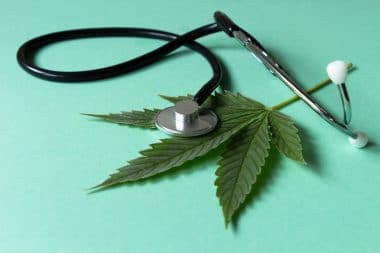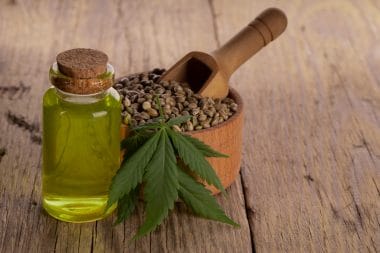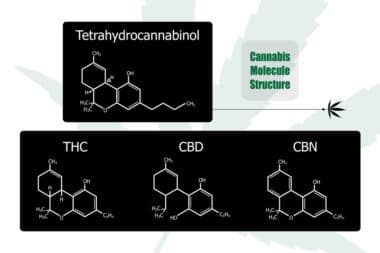We, at HealthStatus, know how it feels to be a beginner. It may be isolating, confusing, and at times it can be depressing. One major reason for this is one’s unfamiliarity with the situation, and/or of the topic. CBD oil is one of the hottest topics nowadays. Hence, we find it necessary to make a “CBD Oil Beginner’s Guide” in order to help those who are still new to this subject. And in the process, we may help in reducing or eradicating the feeling of being alienated to a very mainstream issue.
What are CBD and CBD Oil?
CBD, short for cannabidiol, is one of the 60 active chemical compounds that can only be found in the cannabis plants. These compounds are called cannabinoids. CBD is the second most prevalent cannabinoid next to TCH or tetrahydrocannabinol.
THC is the compound found in the cannabis plants that causes psychoactive or mind-altering effects. On the other hand, CBD is not psychoactive, or it does not give a person a “high.” The THC concentration in a CBD product is very crucial. It can draw the line between being legal and illegal depending on the state where you at.
CBD Oil is simply the oil that is extracted from the cannabis plants. The two major sources of CBD oil are the hemp plants and marijuana plants. In this article, our sole focus is on industrial hemp-derived cannabidiol (CBD).
Industrial hemp-derived CBD has a THC concentration of less than 0.3%, whereas marijuana-derived CBD has about 5%-35% THC.
What Are the Benefits of Using CBD?
If there’s one major reason why CBD is popular, it cannot be because it’s intoxicating or it makes people feel high. Nevertheless, the buzz around CBD continues to get louder by the day, and we can attribute that to its health benefits. Studies have shown that CBD may provide a solution to some major health problems. And people who’ve tried it can attest that CBD really helps in treating several conditions, such as chronic pain, cancer, diabetes, Crohn’s disease, PTSD, anxiety, depression, arthritis, cardiovascular disease, multiple sclerosis, Parkinson’s disease, epilepsy, antibiotic-resistant infections, and schizophrenia.
Scientific research has also shown that CBD may be therapeutic in the following conditions — acne, ADHD, addiction, alcoholism, amyotrophic lateral sclerosis (ALS), Alzheimer’s disease, asthma, atherosclerosis, autism spectrum disorder (ASD), autoimmune diseases, endocrine disorders, fibromyalgia, HIV and AIDS, irritable bowel syndrome, kidney disease, liver disease, neurodegeneration, osteoporosis, skin problems, sleep disorders, stress, traumatic brain injury, weight loss, and more.
How to Take CBD?
CBD oil can be taken in different ways, and each has its own advantages and disadvantages. Finding the right method of consumption for you may be tricky since our bodies react differently. Hence, you may need to try it for yourself and check the best method that works best for you.
The four common methods of consumption for CBD oil are ingestion, inhalation, topical application, and sublingual application. The time of onset and duration of effects may differ from one method of consumption to another.
How Much CBD Should I Take?
Finding the right dose and making the most out of CBD oil can be challenging not just for the consumer, but also for doctors. The mantra “start slow and go slow” is suitable for CBD therapy.
Moreover, the answer as to how much CBD should you take depends on several factors:
- Body Weight: Generally speaking, heavier people need a larger dose in order to get the desired effects from CBD.
- Concentration: This refers to the amount of CBD (in mg) in a product.
- Desired Effects: CBD is used for different health purposes. When your main reason for using CBD oil is mainly for acute pain relief or general health, then you might need a lower dose as compared to someone who might be using CBD for cancer, depression, or more serious health problems.
- Method of Consumption: The way you use or take CBD also makes a difference. The effects of orally administered CBD can last as long as 4 to 12 hours, but the onset of effects may take about 30-90 minutes. On the other hand, the onset of effects from inhaling CBD may only take seconds to minutes, but the duration may subside after 2-3 hours. However, the main problem with inhaling CBD is that it’s harmful to the lungs.
- Tolerance: Over time, one may develop tolerance to CBD. This means that in order to get the same desired effects, one should take a larger dose of CBD.
CBD Side Effects
Some research indicates that CBD may trigger side effects, such as:
- Anxiety
- Changes in appetite
- Changes in mood
- Diarrhea
- Dizziness
- Drowsiness
- Dry mouth
- Nausea
- Vomiting
There are also some indications that CBD may be harmful to the liver, as it increases the level of liver enzymes.
Does CBD Affect Other Medications?
Yes, CBD inhibits the cytochrome P450 enzyme, which plays a major role in metabolizing many drugs. By inhibiting this enzyme, CBD may increase or decrease the effects of a certain drug. As such, in some cases, a physician might request for a medicine blood level test while taking CBD.
Are you ready to dive in the CBD bandwagon? If so, what’s the desired effect that you are expecting to get from CBD? What method of consumption are you eyeing on? We’d love to hear from you. Feel free to share your thoughts in the comments below.









Reply